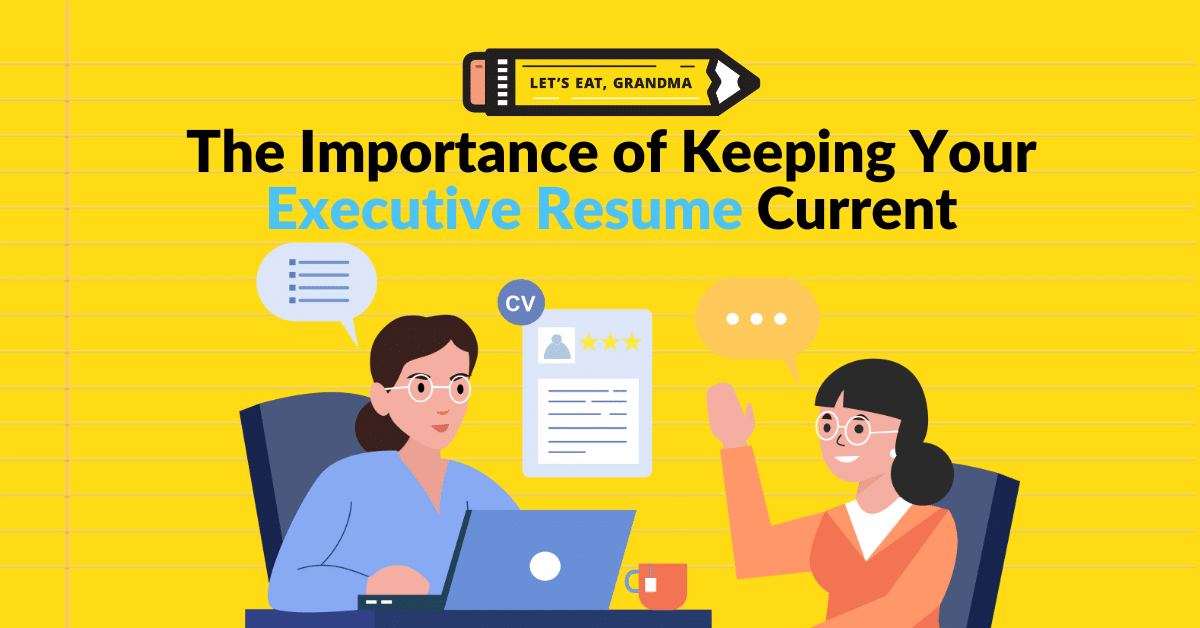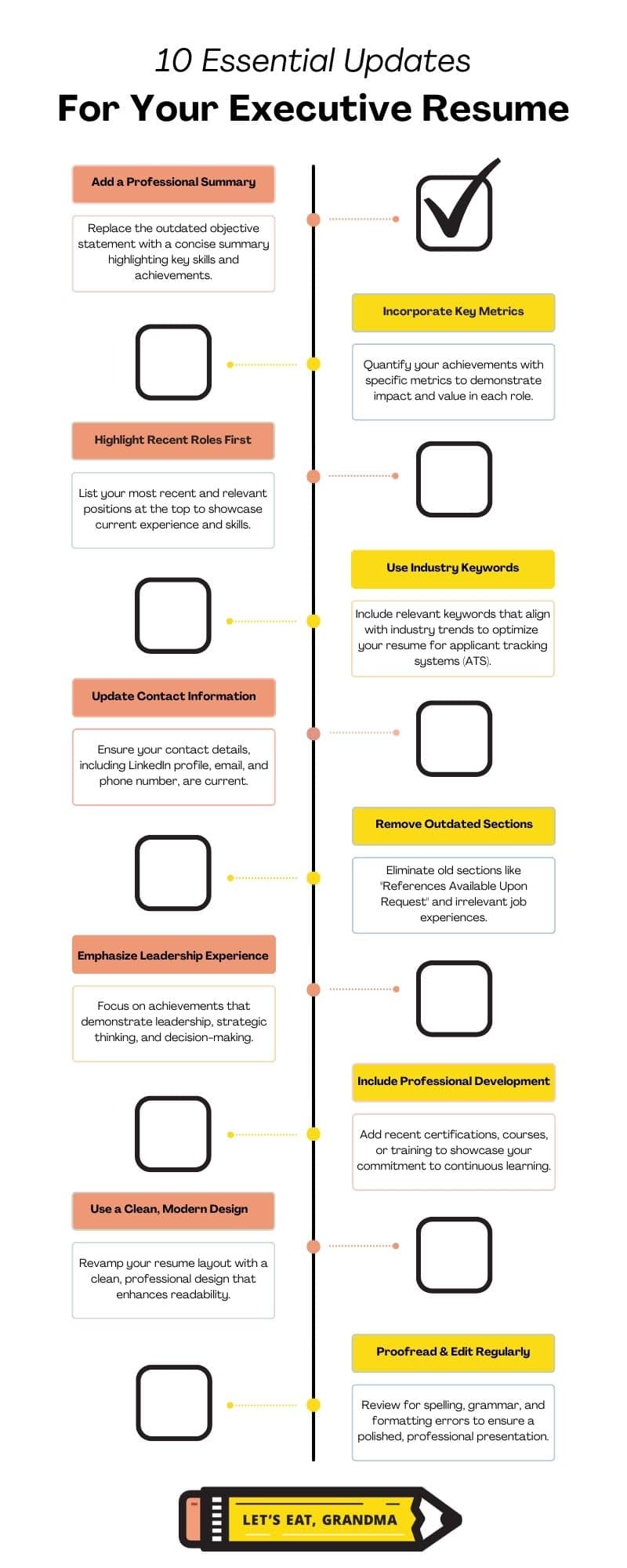If you’re like many senior-level professionals, an executive resume update is the last thing on your mind. It commands all of your attention when you’re in the midst of a job search, but once the job is secured, it’s often forgotten until it’s needed again. Your focus shifts from keeping your personal branding materials in tip-top shape to excelling in your current role and leaving as big of an impact as possible.
However, doing both simultaneously is the better approach. Keeping your executive resume current and always having it ready to go complements everything you do in your current role. That’s because, contrary to popular belief, your resume isn’t only a tool for job searching – it’s a strategic asset that you need just as much when you’re happily employed as when you’re looking for a new opportunity.
This probably isn’t something you often hear, so in this guide, we’ll share why having an executive resume update can benefit you in many ways beyond the standard job-searching phase.
>>> Free download: Executive resume update checklist <<<
Prepare for unexpected opportunities
If there’s a known fact about executive-level opportunities, it’s that they can come unexpectedly. Board positions, consulting roles, internal promotions, and other opportunities can arise when you least expect them. Out of nowhere, you may find yourself in discussions about a potential new role at a time when you haven’t updated your resume in years.
In contrast, you may also find yourself in situations where you need to leave your current job unexpectedly, given the current layoff landscape and how quickly things can change in the business world. And again, it may be the case that you haven’t updated your resume in years.
In both scenarios, having an updated resume keeps you fully prepared and ready for any role changes.
If you’re laid off, you’ll feel less apprehensive and more confident knowing that you have a strong resume on hand to start your job search. This is especially since regular updates ensure that the resume aligns with your career trajectory and goals. It also means you can start reaching out to your network immediately, without the delay of updating documents, and capitalize on potential opportunities before others do.
Similarly, if you’re tapped for a promotion or other opportunity, having an updated resume will save you the stress of scrambling to put one together at the last minute. Plus, it’s always a competitive advantage to be able to quickly provide a current and polished resume when needed. It shows that you value your professional brand and are always prepared for what comes your way.
Regardless of the situation, having an updated executive resume allows you to focus on your performance and preparation for the new role rather than worrying about updating your resume at a time when you may already be feeling overwhelmed.
Pro Tip: It’s a misconception that internal promotions or lateral moves don’t require a resume since you’re already within the company. HR and internal leadership teams will often require one for your employee file and to ensure consistency in the hiring process, so it’s important to have an updated resume at all times.

Photo by SEO Galaxy on Unsplash
Reflect ongoing achievements and skills
Being in the position that you are, the chances that you’ve had success in your career so far are high. However, the question is: where are they documented? The answer is probably “not on your resume.”
If your achievements, awards, results, and acquired skills are only living in your head, they may easily be forgotten. This is even more applicable to metrics, which are easier to forget, yet their importance increases as you advance in your career.
As such, it’s important to document these ongoing wins as they happen, not just when you’re updating your executive resume every few years. This not only serves as a reminder for yourself but also provides concrete evidence of your current capabilities and career growth.
Here are some tips to track and add accomplishments to the resume over time:
- Create measurable goals for yourself and track progress towards them, including any positive outcomes or results achieved.
- Start an “accomplishment log” where you can quickly jot down key achievements (with metrics) as they happen. This could be in a document, spreadsheet, or even a note on your phone.
- Update your LinkedIn profile to reflect new skills, projects, or accomplishments. Sometimes, an update on LinkedIn can be easier than updating your resume, and it can serve as a good starting point for when you do decide to update your resume.
- Consider keeping a portfolio of work samples, such as presentations, reports, or projects, that showcase your skills and accomplishments.
- Set reminders for yourself to review and update the method you choose to use (accomplishment log, LinkedIn, portfolio, etc.) on a regular basis, such as weekly or monthly. It’s preferable not to rely on memory to remember to update these important documents.
- Set a separate reminder to update your resume based on the information in your chosen method. This could be every 3 or 6 months, depending on how quickly your career is advancing.
Pro Tip: As you document your accomplishments, always try to add elements that demonstrate thought leadership. These could be keynote speeches, publications, awards, or any other recognition. On your resume, these could be added under either existing or new sections such as “Publications” or “Awards”. Alternatively, if they’re not too frequent, you could also include them under the relevant job experience section.

Photo by Microsoft 365 on Unsplash
Align with evolving industry trends
Last but not least, it’s important to remember that your resume is meant to be a living document, not a static one. It’s not designed to be set in stone at the beginning of your career and remain the same throughout.
However, we’re not only talking about updating your resume with your own personal and professional growth. Similar to how you grow and evolve, industries and job expectations evolve as well, and it’s of utmost importance to keep up with these changes and have your resume reflect them in order to stay relevant and competitive.
For instance, even the very nature of resumes is changing, and if your resume is outdated, it can fail to resonate with modern expectations. Below are a few examples of how this could take shape:
- Objective statements are becoming obsolete, and professionals are now expected to start with a summary of qualifications that highlights their key skills and experiences instead. If you still have an objective statement, you may be perceived as behind the times.
- Wordiness was once a sign of sophistication, but now it’s more about precision and conciseness, especially in a culture of applicant tracking systems. Accomplishment-based bullets, with specifics quantifying your achievements, are now the norm. If you submit a resume with wordy job descriptions in your Experience section, you may not even make it to a human eye.
- It’s also important to avoid outdated language. For instance, including the phrase “References available upon request” is no longer necessary, and other cliches such as “self-starter” or “team player” aren’t as effective as concrete examples of how you have demonstrated those qualities in the past. Failing to update your language can give the impression that you’re all talk and no action.
- Including every position you’ve ever held on your resume was, at one point, expected. But now, it’s more important to be strategic about what you include and exclude. This means tailoring your resume for each specific job application, highlighting relevant experiences and skills that align with the role. Simply listing every job you’ve had, going all the way back to the 90s, can come across as lacking direction.
While these all may seem like minor changes, they can make a big impact on how your resume is perceived by potential employers. However, the good thing is that it’s much easier to update your resume incrementally whenever you hear about new trends or tips, rather than wait for 10+ years and have to do a major overhaul all at once.

Photo by LAUREN GRAY on Unsplash
Conclusion
As you see, regular resume updates aren’t only needed when you’re changing jobs or industries. They also help you stay in touch with the bigger picture of your career, constantly reflecting on your achievements and goals while keeping your larger goals and motivations in mind.
On top of that, keeping your hand on the pulse of the latest industry trends and even resume writing trends enables you to stay relevant and guarantees that you’re always presenting yourself in the best light possible to potential employers.
So, even if you’re content with your current job, don’t forget to regularly update your executive resume and keep it in line with the times. That way, nothing will take you by surprise, and you won’t ever find yourself in a situation where you have to “put anything together” at the last minute. Your future self will thank you for it.
Ready for more job search help?
Sign up for a free Senior Writer Resume Critique to see what’s holding you back from landing interviews. One of our top professional resume writers will give you personalized feedback on the top 3 items you can improve based on our expert practices!




